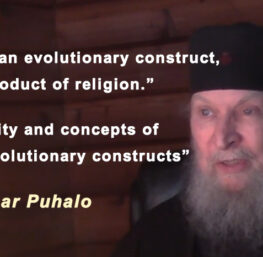7/25/2010 – Miguel A. Guanipa –
Most evolutionary scientists are unacquainted with the nearly extinct brand of academic deference which comes from a humbling realization that a science degree does not automatically confer a plenary understanding of the vast complexity of the universe. The least diffident ones in the field are not shy about airing their personal grievances against what they view as Religion’s insolent encroachment on the scientific enterprise.
In response, Christians often feel compelled by necessity to point out that these men of science step outside of their boundaries, when they advise the former not to engage in polemics about scientific matters too lofty for their intellects to comprehend. Christians are hence tasked with reminding overzealous scientists that their discipline is more suited to probe the sundry observable schemes that animate our meticulously woven universe, and not to pronounce moral judgments.
While most scientists readily recognize this glaring inadequacy in their discipline to wrench doctrine from their permutable, yet no doubt very practical findings, some of their less prudent peers see it as their moral duty to impose a gag rule on Religion, claiming that when it comes to ultimate truth, they are better equipped to offer the most plausible and convincing arguments, as opposed to the myriad fancies and superstitions that Religion is saddled with, which often pose more of a hindrance to progress.
Today this tension prevails, between secular Scientists and Christians, both refusing to brook any compromise on their presumed monopoly on reality.
But one intrepid evolutionary psychology lecturer at Swansea University plans to put an end to this feud once and for all. His name is Steve Stewart-Williams, and his latest attempt is a series of articles boldly titled “Re-writing Morality”, where he tries to persuade his readers of the impeccable logic of Darwinism, and its unique ability to provide definitive answers to the socially polarizing moral quandaries of suicide, euthanasia and abortion.
Williams’ primary contention is that the “facts” of Darwinism can effortlessly nullify any “widely dismissed” authoritative claims to truth and/or cursory solutions that Religion typically prescribes when faced with such vexing moral dilemmas.
He freely employs the standard circular reasoning that evolutionary scientists who harbor an animus toward Religion instinctively default to: First, affirm that the Darwinian model is far superior to any religious worldview, and anyone who disagrees is either grossly misinformed or captive to the intellectual constrains inherent to his or her outmoded Religious beliefs; or maybe both. Then, declare that any vestiges of once considered normative ethical precepts that originate from religious sources have long been debunked by the spellbinding, continual advances in general science; and finally, implement a wholesale revision of traditional mores, as the latter have been deemed unviable in modern times by virtue of their fragile, irrational underpinnings.
As he builds his provocative argument, Williams assures his readers that the majority of evolutionists are smart enough to “reject the view that their theory has no implications for any moral question”. Of course this is only half true. Most thinking evolutionists are keenly aware of the moral implications of their theory; only they are most reluctant to parse them in public, since there is a wealth of empirical evidence that these implications tend to invariably unfold into rather unsavory social consequences — particularly when dealing with people’s moral uncertainty surrounding the ultimate questions of life, death, and that irritatingly intangible moral abstraction Christians insist on referring to as “human dignity”.
In a rather bold statement Williams reasons that “Evolutionary theory does not directly contradict the doctrine of human dignity (snip)…it undermines the foundations upon which it rests and the worldview within which it makes any sense”. In other words, he does not accuse his opponents of having the wrong motives; he simply suggests that their premises do not hold any currency in the real world, summing up his dissertation with a somewhat gentler, yet equally as contemptuous a dismissal as if he had simply assured his opponents that while he respects their arguments, they are only valid when operating under a grand delusion.
Seeing that from the outset Williams betrays a singular affection to Darwinism, it is not surprising that he also concurs with the assessment of atheist philosopher, and proponent of infanticide Peter Singer, who also believes that in the wake of evolutionary theory we must rethink the value we place on the lives of “human beings vs. other animals”. He goes on to declare that “with the corrective lens of evolutionary theory (italics mine) the view that human life is infinitely valuable suddenly seems like a vast and unjustified over-valuation of human life”; hence “there is no longer any reason to think that suicide or voluntary euthanasia is necessarily wrong under any or all circumstances”. Behold, the supreme state of enlightenment to which evolutionary psychologists want to elevate humanity, where — as Williams admonishes us — we may “no longer take a ready-made answer to these difficult questions from a holy book or religious authority”.
But Williams’ argument hardly comes off as an attempt to pursue truth, but rather to issue a tribal fiat that those in his camp are its sole, culturally ordained purveyors. He also seems to forget that simply stating that scriptural claims have been rendered obsolete by the alleged devastating evidence from evolutionary science does not make the Darwinian claims more plausible. It is, no doubt, just as wrong for Christians to assume that the long overdue public exposure of the theory of evolution’s glaring variances with actual scientific evidence will guarantee that the claims of Christianity finally get a public hearing. In the end, both worldviews must stand or fall on their own merit, under impartial and careful scrutiny, rather than assume vindication by merely denying the validity of opposing claims.
Evolutionary theory may appear to undermine the Biblical worldview, but only as long as one chooses to believe against all the evidence to the contrary, that the former is a settled fact of scientific inquiry.
Contrary to what Williams thinks, he has not really stumbled upon a novel idea. Indeed it is an ancient malaise — pardon the irony of my reference — going back to the time when the very first created humans unwisely judged that they could fashion their own personal moral code with impunity.
We may indeed banish God from the picture, as Williams suggests, and decree that human life has not been granted a privileged existence with unique purpose and value in an ultimately meaningful universe. But one can’t help but ask: since Williams has no choice but to count himself as a mere byproduct of the same unguided, purposeless crapshoot game of origins he so eloquently champions — what reason is there to impute any special significance to what he has to say in the first place?
HT: American Thinker



